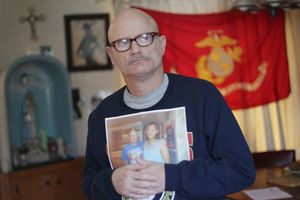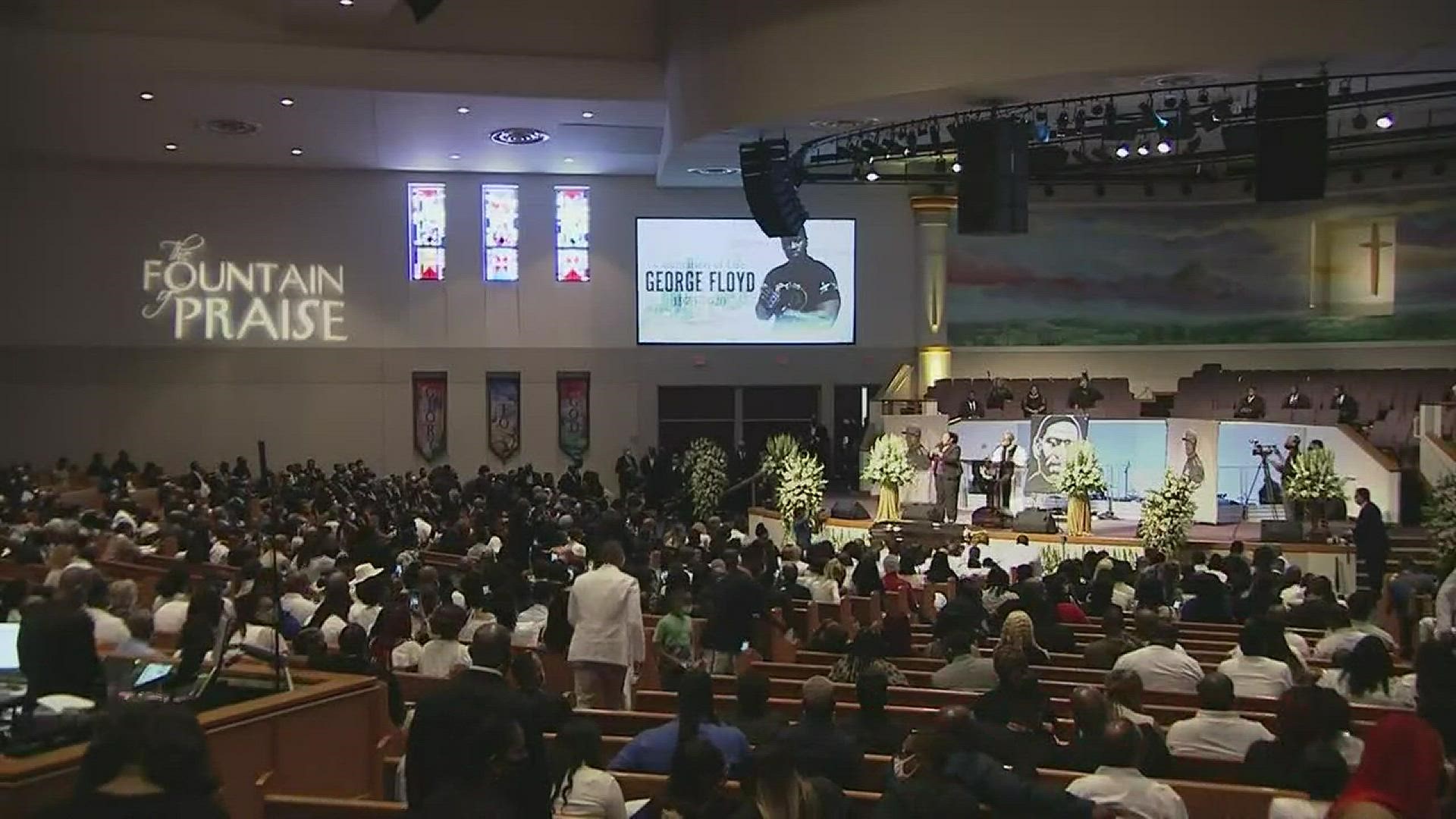PALM SPRIINGS, Calif. — Tom Swann planned to marry Guillermo Hernandez at a Palm Springs golf course on Valentine’s Day.
But when immigration agents arrested Hernandez, an undocumented immigrant, the venue changed to the federal Calexico detention center, where Hernandez awaits a deportation hearing.
The marriage, which has been approved by both the facility’s warden and U.S. Immigration and Customs Enforcement, will be the country’s first same-sex marriage for a detainee in an immigration detention facility, according to Lauren Mack, an ICE spokeswoman.
“The request was reviewed and approved by the facility’s warden,” Mack wrote in an email. “This is the first same-sex marriage request submitted by a detainee at an ICE detention facility.”
![Indy mayor officiates gay wedding on final day in office [oembed : 81352576] [oembed : 81352576] [oembed : 81352576] [oembed : 81352576]](/Portals/_default/Skins/PrestoLegacy/CommonCss/images/smartembed.png)
As long as detainees are legally eligible to be married in the state they are detained, the request can be granted. Last June, the U.S. Supreme Court ruled that same-sex couples can marry.
For Swann, 58, who was part of the first group of openly gay service members to march in the Palm Springs Veterans Day parade and helped erect the country’s first Gay Veterans memorial, the historic nature of the wedding makes it much more special.
He and Hernandez met through a mutual friend last May.
Swann, who is legally blind and has AIDS, loved Hernandez’s positive energy and contagious laughter. Within a month the two were living together. Hernandez became his caretaker, reminding him when to take his medicine, guiding him on walks outside, and keeping the house clean.
“I don’t smile a whole lot or laugh a whole lot like I used to when I was younger,” Swann said. “He makes me laugh, and smile, and brings joy to me. He’s a very happy person.”
On Christmas Eve, Hernandez’s 21st birthday, the two got engaged.
Swann, who has lived alone most of his adult life in the Coachella Valley, was so excited that he changed his email to Tom Swann Hernandez.
But on Dec. 28 their wedding plans were put on hold. Hernandez, who had previously been banned from Spa Resort Casino for violating their minimum age policy, was arrested for trespassing.
Because Hernandez is undocumented, the misdemeanor caught the eye of immigration officials.
Hernandez moved to Palm Springs with his family when he was 7 and has not returned to Mexico since, said his older sister, Maria Hernandez.
He has spent his entire life in Palm Springs; he played clarinet in the Palm Springs High School band, graduating in 2013.
“He is never in a bad mood, he always has a smile,” said Maria Hernandez, 24. “He was never a bad child.”
But he did get into occasional trouble.
Apart from the trespassing charge, Hernandez was arrested once for drug possession and another time after a parole officer found drug paraphernalia in his apartment.
Three misdemeanors disqualified him from renewing an employment permit he had obtained through President Obama's Deferred Action for Childhood Arrivals initiative, which protects children brought into this country illegally from deportation and allows them to get a work permit.
His family saw the latest arrest as an opportunity to get his life in order. His lawyer, Rachael Alcorn, arranged for him to enter into a one-year rehab program. At a Jan. 25 hearing at Riverside County Superior Court in Indio, Hernandez thought he would start the program, his sister said.
“We were happy,” she said. “He thought he was going to rehab. His clothes, his hair spray, his mousse, all that was in the bag because he thought he was going to rehab.”
![Tom Swann, on fiancé Guillermo Hernandez [pullquote : 81352730]](/Portals/_default/Skins/PrestoLegacy/CommonCss/images/pullquote.jpg)
But Hernandez did not leave the courthouse a free man.
ICE officers arrested him inside an elevator. In a matter of days he was transferred to the detention center in Calexico to await his deportation hearing.
Since entering federal custody, Hernandez’s marriage, trespassing case and future in this country have been put on hold.
Because he is in Calexico, Hernandez missed a February court hearing and a judge issued a bench-warrant for his arrest.
Even though Swann and Alcorn have told the court that Hernandez is in federal custody and cannot attend a court hearing in Indio, sheriff’s deputies have repeatedly showed up at Swann’s Rancho Mirage home to look for Hernandez.
Their latest visit was March 2, while Swann spoke with a reporter.
About a dozen deputies wearing bullet-proof vests searched every room of the house for a person who was in federal custody more than 100 miles away. That was their third visit, Swann said.
Alcorn, Hernandez’s lawyer, called it “a continued waste of the resources of the Sheriff’s Department to continue to annoy and harass Mr. Swann when it was made clear to the court that (Hernandez) is in immigration custody.”
Riverside County Superior Court spokeswoman Marita Ford declined to comment on a pending case.
Despite the unwelcomed visits to Swann’s home and the deportation case looming over Hernandez’s future, the two remain committed to their relationship, Maria Hernandez said.
On Feb. 28, she drove Swann two hours to visit his fiancé in Calexico.
“He is devastated about all of this,” she said. “I know he loves my brother because no person would do this much for him.”
The couple has not retained a lawyer for the deportation case — Swann says lawyers have asked for $4,000 which he cannot afford — but they are hopeful their marriage will help.
Detainees can fight a deportation case if their “removal would result in exceptional and extremely unusual hardships to your United States citizen or lawful permanent resident spouse, parent, or child, and you are deserving of a favorable exercise of discretion on your application,” according to the executive office for Immigration Review, which is part of the Department of Justice.
Swann and Hernandez are scheduled to get married on March 14 at the MTC Imperial Regional Detention Facility, according to Hank Kuiper, who is performing the ceremony.
Kuiper is licensed to conduct weddings in Imperial County and has performed about 100 of them in prisons and ICE facilities in the last eight years. This will be his first same-sex marriage.
“They have their preference of how they feel about each other and I respect that,” said Kuiper, 74, who is the former mayor of El Centro, a city only a few miles away from the Mexican border.
Although their wedding date is set, Hernandez’s future in the United States remains unclear. His deportation hearing is scheduled for March 23.


![635927107716941281-ICE-Wedding870.JPG [image : 81339462]](http://www.gannett-cdn.com/-mm-/3bab9464f2230ccc579fb0611f63efca98561b11/c=475-0-3845-2880/local/-/media/2016/03/04/PalmSprings/PalmSprings/635927107716941281-ICE-Wedding870.JPG)
![635927110448206789-ICE-Wedding868.JPG [image : 81339642]](http://www.gannett-cdn.com/-mm-/3bab9464f2230ccc579fb0611f63efca98561b11/c=475-0-3845-2880/local/-/media/2016/03/04/PalmSprings/PalmSprings/635927110448206789-ICE-Wedding868.JPG)
![635927108446245956-ICE-Wedding866.JPG [image : 81339512]](http://www.gannett-cdn.com/-mm-/a1e48fcbec6f367306a86754c37d11d61d3a8df5/c=153-0-3523-2880/local/-/media/2016/03/04/PalmSprings/PalmSprings/635927108446245956-ICE-Wedding866.JPG)
